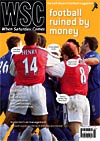 When it comes to the manager's job, clubs are rarely in doubt whether they should, as Ron Atkinson would say, stick or twist. But would it make sense to hold their nerve when things go wrong? Joe Boyle has gives his opinion on his club Sunderland
When it comes to the manager's job, clubs are rarely in doubt whether they should, as Ron Atkinson would say, stick or twist. But would it make sense to hold their nerve when things go wrong? Joe Boyle has gives his opinion on his club Sunderland
Peter Reid’s Sunderland career is in the balance. That’s if you believe internet polls: a recent one had just over 50 per cent of the 5,000 votes demanding Reid’s head. Questioned about the poll, Reid was unruffled. Criticism came with the territory, he said, and people should not forget the degree of success he had brought the club. Internet-savvy he probably isn’t, but there’s nothing wrong with his sense of history.
Coming in the middle of the current poor run, Reid’s self-confidence simply adds to his opponents’ indignation. What makes it worse for them is that the manager is not going to quit and the chairman is not going to sack him, unless total meltdown occurs on the pitch. Even then, one suspects that Bob Murray, Sunderland’s mouse-like chairman, would be reluctant to oust his manager. “Peter has provided the vital ingredient that Sunderland has not known for decades – continuity,” Murray said when Reid signed a deal last year that extended his contract until 2005. “He has proved that he is a top, established Premier League manager and I truly believe this club is his destiny.”
“Destiny” is a pretty strong word, but the more significant one is “continuity”, not least for Murray, whose fortunes are inextricably linked with Reid’s. Appointing Reid in 1995 was Murray’s final gamble. With the club just seven games from a potentially fatal relegation to the Second Division, Murray had to make a correct call. The subject of much vitriol, he had overseen a dramatic fall in the club’s fortunes with dwindling attendances, low-grade football and a ground fit only for nostalgia.
He had also been responsible for the rapid-fire appointment of one dead-beat manager after another. In just over three years (between the end of Dennis Smith’s courageous reign in December 1991 and the arrival of Reid in March 1995), Malcolm Crosby, Terry Butcher and Mick Buxton had all flopped. In each instance, Murray proved himself to be a woeful judge of character and ability as well as totally incapable of attracting a high-profile name.
Considering this track record, pulling Reid out of the hat seems like an outrageous piece of luck. To his credit, Murray realised this and started to build on his good fortune, quite literally, by embarking on the construction of the Stadium of Light. His personal standing has since rocketed and it all coincided with Reid’s arrival. So when Murray talks about Reid’s destiny, he is also talking about his own. Which is why Reid’s job is secure.
Continuity is clearly preferable, whether you are talking about government ministers, teachers or football managers. Which is not the same thing as arguing for continuity just because it is fashionable to do so. Murray was right to sack Crosby, Butcher and Buxton when he did. His mistake was appointing them in the first place.
But then there is no way of telling whether a manager will succeed or not. Past records count for little: the list of managers who did brilliantly at one job only to fail thereafter is endless, from Mike Walker to Louis van Gaal. The lesson is simple: if you find a man who brings you more success than you had before he arrived, stick with him.
From WSC 181 March 2002. What was happening this month